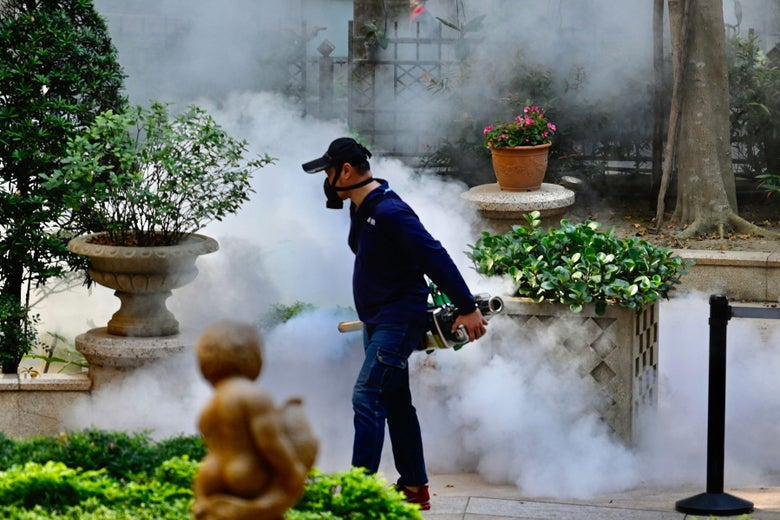
A worker disinfects an area of the Xindian district to prevent the spread of COVID-19 in New Taipei City, Taiwan, on Monday. Sam Yeh/Getty Images
In some countries, the healthcare delivery system is considered part of, and incorporated into, a national public health response. One of the most notable recent examples is the Taiwan response to the COVID-19 outbreak, in which the outbreak has been very much contained, particularly given to the island’s proximity and social and economic relations with China and its population density.
If you live in the United States, you know this type of coordinated response is not possible to conduct through our healthcare system, because our healthcare is optimized to provide reimbursable services, not health. We have fragmented care, a patchwork of coverage that is worsening as unemployment skyrockets, and thereby the inability to have a coordinated data infrastructure.
Many have suggested that the U.S. is incapable of responding to the COVID-19 pandemic because of “cultural” differences from Asian countries, but that is misleading. Prior to this pandemic, the CDC has led a U.S. (and even international) in response to many others, from Zika to H1N1. South Korea and Taiwan are democracies- it is not a given that democracy is incompatible with public health, or that citizens are incapable of following guidelines (including wearing masks on a regular basis).
Blaming our culture absolves our policymakers of responsibility and does not account for the effects that leadership has on our culture. History has shown us time and again that U.S. political leaders’ appeals to racial prejudice (whether overt or subtle) have enabled policymakers to defeat attempts to have a more just healthcare system, whether a national health system, single payer insurance, or guaranteed coverage in a competitive market. If we have “cultural” barriers, it is not our love of liberty– it is that our leaders have understood that racialized arguments can falsely convince people that health justice threatens liberty.
A successful public health effort requires features leading above U.S. healthcare, including: (1) equitable testing, (2) culturally and linguistically appropriate community-based contact tracing, (3) resources to enable those infected to safely quarantine, and (4) centralized secure data systems for tracking.
Our national and local governments have provided re-opening guidelines based upon broad indicators for testing, tracing, health system capacity, disease transmission, and mortality. Reliance upon population-based numbers ignores the importance of equity on any metric, and thus there will continue to be outbreaks in marginalized communities, whether Black neighborhoods, under-resourced nursing homes, meat-packing plants, immigration detention centers, jails and prisons, or tribal nations.
People are dying, and particularly people of color. This is not due to our culture, but due to our policy choice to rely an unjust system to manage, fumbling, with this pandemic.
